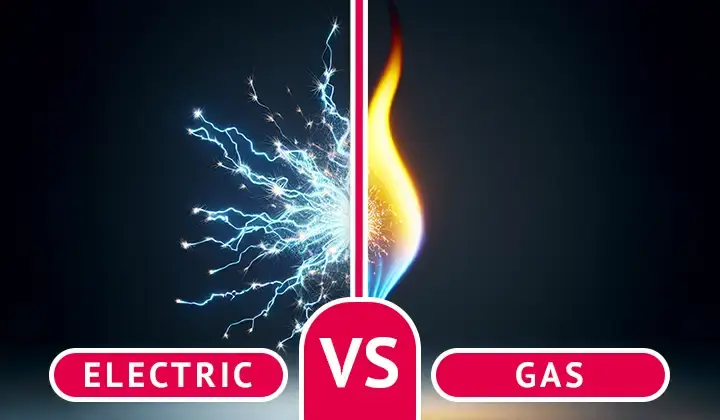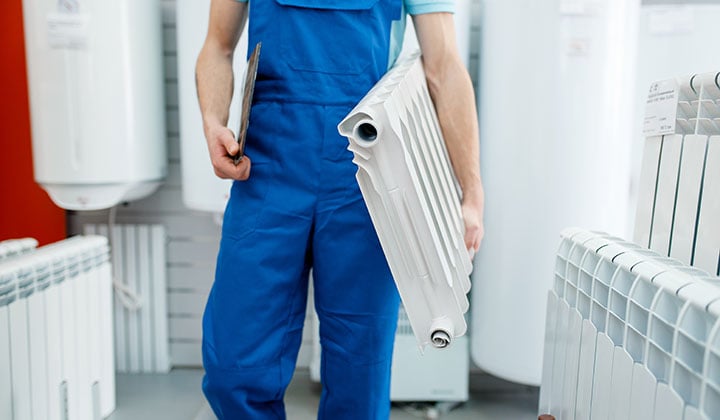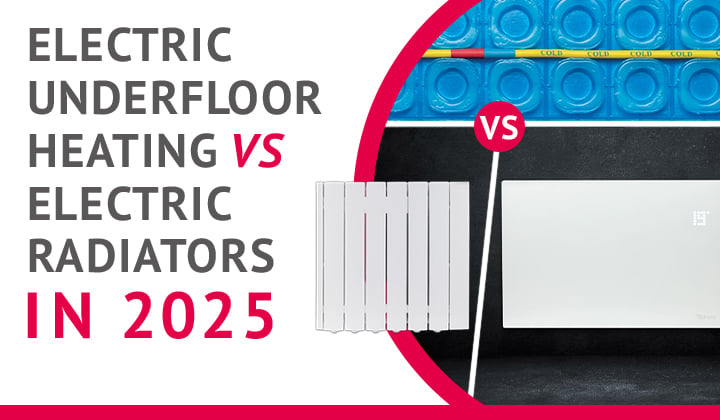6 min read
Are electric radiators better than traditional central heating system?
With a big shake-up well underway for how we heat homes, more homeowners are exploring different ways to heat their homes in a more cost-effective...

Most of us homo sapiens dislike change. The status quo feels comfortable and we do our best to avoid disrupting. Even when change is so obviously needed.
So, when the powers-that-be tell us that residential home heating is ‘all change at Watford Junction’, there is understandably a list of questions as long as your arm.
One of those questions that we get asked a fair bit is ‘what is more efficient, electric radiators or central heating radiators with a gas boiler?’ I don’t have a degree in thermodynamics, so I’ll describe this using lay-man’s language, based on extensive research online, and from conversations that we have day-in, day-out on construction sites, trade counters and consultant’s design studios.
Grab your beverage of choice and enjoy the next 7-minute read.
We must make the point that ‘efficiency’ and ‘cost’ are two different things that are often used interchangeably. Put simply, efficiency is ‘capable of producing desired results with little or no waste’, whereas cost is ‘the amount or equivalent paid or charged for something’ – AKA the Great British Pound, spondoolies - the dough.
When thinking about efficiency, we need to think about how much ‘stuff’ we waste. So, in the context of heating efficiency, how many units of energy that we waste. In a heating system, wasted energy happens when it is stored or moved.
For example, the heat that is in your airing cupboard at home is actually wasted heat – it has escaped from pipes and cylinders that are less than 100% efficient. Although we can put this heat to good use by storing our towels, bed linen and probably the ironing board in the airing cupboard, in the ideal world, you wouldn’t be heating that room to 28oC.
Another example is wasted heat from pipe runs – y’know that thin strip of the bathroom floor that feels a bit warmer than everything else around it that you try and use during December so that your feet don’t get frostbite when you’re in the bathroom at 2am? Yeah, that one. That is probably the escaped heat from a hot water pipe.
Side note
As a side note, in the UK, we waste about 62.5billion litres of water every year running the shower, waiting for it to get warm. That is all water that we have paid to heat but has cooled down in the pipe runs to your shower. Mental.
Of course, you can insulate cylinders and pipes, which will limit this wastage but it can never be fully eliminated.
Efficiencies of different heating systems compared
So, by way of some data, it seems that a traditional central heating system will lose between 20-40% of the energy that you pay. Just for transporting and storing the heat energy, once it is used by the gas boiler.
The average efficiency of a modern gas boiler is typically around 85-95%, meaning that it converts 85-95% of the fuel's energy into heat, with the remaining percentage lost as exhaust gases and other inefficiencies. 95% efficiency sounds pretty decent, but when you factor in the losses of energy as this is transported around the house, the overall system losses are compounded. The overall system could end up being 50-55% efficient.
If we compare this to electric radiators, the average efficiency of an electric radiator is typically around 100%, as nearly all the electrical energy is converted into heat, with minimal losses. Coupled with this, you can ‘transport’ electricity around your house without losing any of the electrical juice you paid for. (There’s something called voltage drop, which isn’t normally measured extensively in a residential property but this should be kept within a 3% range of nominal, so negligible for what we’re thinking about).
So, in short, a gas-fired central heating system is significantly less efficient than using electric radiators to heat your room.

Why then have we installed 28million homes in the UK with gas boilers then, there must be a catch? – I heard you say it…
It’s because gas has been (and currently still is) a cheaper form of energy. As of mid-2024, average prices for gas and electricity in the UK are approximately: -
Gas: Around 12 to 15 pence per kilowatt-hour (kWh).
Electricity: Around 30 to 35 pence per kilowatt-hour (kWh).
*Taken from The Energy Shop at the time of publication.
These prices can vary based on factors like energy supplier, region, and specific tariff plans, but electricity can be nearly 3x as expensive as gas.
These low prices have meant that it’s been ‘ok’ to waste half the energy we pay for, because it’s still the cheapest way of heating our home.
However, as the green agenda of HM Government kicks in, this dynamic will change. The more renewable electricity that we generate, the greener electricity becomes. There will also be a rebalancing of the energy tariffs that will narrow this gap between the electricity and gas unit prices. This will make electricity cheaper (comparably) than gas and swing the balance in favour of using electricity . There has been some talk (we await confirmation of the rumours!) of lowering the levies on electricity, but you can see here how much your current bill is made up of imposed costs. As a headline number, 6% of your gas price is levies, whereas 16% of your electricity price is levies.
*Taken from Energy & Climate Intelligence Unit at the time of publication.
The other thing is, that no matter how much green energy we produce, if we’re going to collectively hit the NetZero targets, we must think about efficiency. Fixing the tendency to not understand (and sometimes accept) the amount of energy we waste is an integral part of hitting this goal.

So, to summarise, electric heating systems are more efficient than traditional gas central heating systems, but this doesn’t necessarily mean they are cheaper to run. This is because of the imbalance of energy prices, which is something that will be changing, so watch this space.
If you want to have a chat about any of these points, the team and I are available on the phone – 0800 019 5899 – or contact us via the website. Anything we know we’d love to share with you, and if you have something to add to the conversation, we’d love to learn from you too.
Thanks for reading!
Alternatively, you may find the following articles useful:
Is the future still electric? Low carbon heating survey - One year on
Direct electric heating key for decarbonisation of heating in the UK
Heat pumps & direct electric heating – A partnership to Net Zero

6 min read
With a big shake-up well underway for how we heat homes, more homeowners are exploring different ways to heat their homes in a more cost-effective...

5 min read
Popularity in electric heating is rising and it won’t be slowing down any time soon. Let’s take the electric radiator market. By 2025 the European...

12 min read
Electric heating is having a serious glow-up in 2025. Once seen as a backup or an afterthought, it’s now leading the way in energy-efficient home...